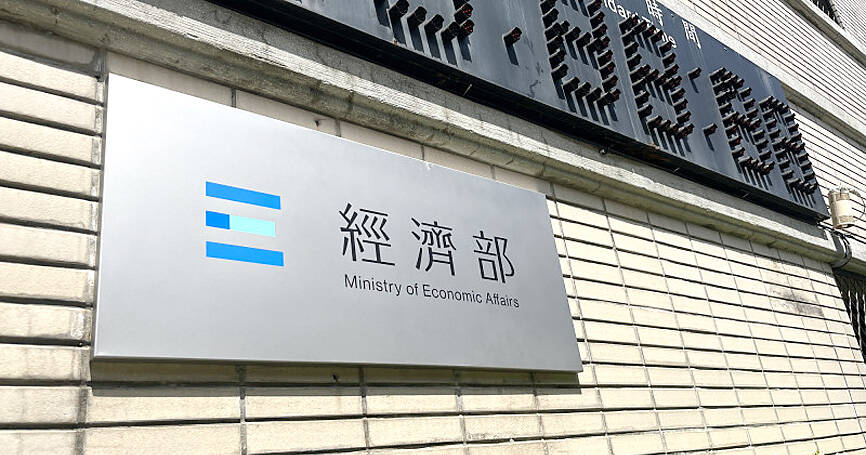Foreign direct investment (FDI), excluding that from China, increased 78.34 percent year-on-year to US$1.69 billion in the first two months of this year, the Ministry of Economic Affairs said yesterday.
Taiwan's FDI calculations were based on foreign firms’ investment applications — to incorporate local subsidiaries, establish joint ventures, inject cash into local units or acquire domestic companies — approved by the Department of Investment Review.
The ministry attributed the 78.34 percent annual increase to substantial investments by foreign offshore wind energy developers.

Photo: Liao Chia-ning, Taipei Times
During the first two months, the department approved Danish wind energy developer Copenhagen Infrastructure Partners’ application to increase the capital of CI Fengmiao Ltd (哥本哈根基礎設施渢妙股份) by NT$22.08 billion (US$668.99 million) to operate offshore wind farms off the coast of Taichung, the ministry said.
The department also approved an application from Orsted Wind Power TW Holding to invest an additional NT$3.59 billion into its local unit to finance its wind farm operations off the coast of Changhua County, the ministry said.
Additionally, MEMC Korea Co, a subsidiary of GlobalWafers Co (環球晶圓), gained permission to launch a Taiwanese unit for NT$6.57 billion, it said.
As for approved investment from China, aggregate value in the first two months jumped 2,746 percent from a year earlier to US$96.28 million, which the ministry attributed mainly to Hong Kong-based Garuda International Ltd (鵬鼎國際) gaining approval to raise investment for its Taiwanese unit, Garuda Technology Co (鵬鼎科技), by NT$3 billion.
Garuda Technology’s business is focused on the production of flexible printed circuit boards and the provision of surface-mount technology services, the ministry said.
Approved outbound investment from Taiwanese firms, excluding that to China, plunged 70.73 percent year-on-year to US$1.16 billion in the first two months, while China investments dropped 61.6 percent to US$223.95 million, it said.

TAKING STOCK: A Taiwanese cookware firm in Vietnam urged customers to assess inventory or place orders early so shipments can reach the US while tariffs are paused Taiwanese businesses in Vietnam are exploring alternatives after the White House imposed a 46 percent import duty on Vietnamese goods, following US President Donald Trump’s announcement of “reciprocal” tariffs on the US’ trading partners. Lo Shih-liang (羅世良), chairman of Brico Industry Co (裕茂工業), a Taiwanese company that manufactures cast iron cookware and stove components in Vietnam, said that more than 40 percent of his business was tied to the US market, describing the constant US policy shifts as an emotional roller coaster. “I work during the day and stay up all night watching the news. I’ve been following US news until 3am

UNCERTAINTY: Innolux activated a stringent supply chain management mechanism, as it did during the COVID-19 pandemic, to ensure optimal inventory levels for customers Flat-panel display makers AUO Corp (友達) and Innolux Corp (群創) yesterday said that about 12 to 20 percent of their display business is at risk of potential US tariffs and that they would relocate production or shipment destinations to mitigate the levies’ effects. US tariffs would have a direct impact of US$200 million on AUO’s revenue, company chairman Paul Peng (彭雙浪) told reporters on the sidelines of the Touch Taiwan trade show in Taipei yesterday. That would make up about 12 percent of the company’s overall revenue. To cope with the tariff uncertainty, AUO plans to allocate its production to manufacturing facilities in

Six years ago, LVMH’s billionaire CEO Bernard Arnault and US President Donald Trump cut the blue ribbon on a factory in rural Texas that would make designer handbags for Louis Vuitton, one of the world’s best-known luxury brands. However, since the high-profile opening, the factory has faced a host of problems limiting production, 11 former Louis Vuitton employees said. The site has consistently ranked among the worst-performing for Louis Vuitton globally, “significantly” underperforming other facilities, said three former Louis Vuitton workers and a senior industry source, who cited internal rankings shared with staff. The plant’s problems — which have not

COLLABORATION: Given Taiwan’s key position in global supply chains, the US firm is discussing strategies with local partners and clients to deal with global uncertainties Advanced Micro Devices Inc (AMD) yesterday said it is meeting with local ecosystem partners, including Taiwan Semiconductor Manufacturing Co (TSMC, 台積電), to discuss strategies, including long-term manufacturing, to navigate uncertainties such as US tariffs, as Taiwan occupies an important position in global supply chains. AMD chief executive officer Lisa Su (蘇姿丰) told reporters that Taiwan is an important part of the chip designer’s ecosystem and she is discussing with partners and customers in Taiwan to forge strong collaborations on different areas during this critical period. AMD has just become the first artificial-intelligence (AI) server chip customer of TSMC to utilize its advanced